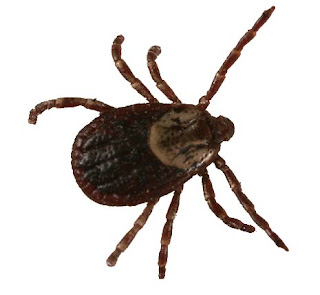Tick Concerns - The Warmer Weather Is Here And So Are The Ticks
 These parasites are not only gross, they can spread serious diseases. It is important that you be aware of possible symptoms of tick borne disease, even though we test annually for Anaplasma, Ehrlichia and Lyme disease as part of annual Heartworm testing.
These parasites are not only gross, they can spread serious diseases. It is important that you be aware of possible symptoms of tick borne disease, even though we test annually for Anaplasma, Ehrlichia and Lyme disease as part of annual Heartworm testing.Ticks tend to be most active in late Spring/ Summer and live in tall brush, grass and wooded areas, where they can attach to dogs and outdoor cats. Most ticks are visible to the naked eye and when they bite, they engorge with blood making them easier to spot.
How to look for Ticks:
While these parasites rarely cause obvious discomfort for our pets when attached, it is a good idea to check your pet regularly if you live in an area where ticks are prevalent, especially if they spend a lot of time outside.- Pass your hands over your pet each time them come into the house.
- Ticks prefer the areas around the head, neck, ears and feet although they can attach anywhere.
How To Safely Remove a Tick:
- Do not use your naked fingers as you may possibly contact a tick borne disease. Never have direct contact.
- Use a tool such as a "Ticked Off" spoon (available at the hospital) to remove the entire tick. Gloved fingers and tweezers ofter don't remove the entire tick.
- Once removed, it can be safely disposed of in a small jar filled with alcohol.
- Have someone or something (treat/ toy) to distract your pet while removing the tick.
- Do not then squeeze, or otherwise irritate the area further, once the tick has been removed. Squeezing or poking at the area tends to do more harm.
- Simply wipe the area with alcohol
- Monitor the area for the next few days for swelling, discharge and, if noticed, schedule appointment.
Things To Do To Reduce Ticks in Your Yard:
- Keep the grass mowed regularly and remove tall weeds.
- Keep rodents to a minimum.
- There are a variety of outdoor treatments. One is a tick tube that rely on the natural nesting instincts of mice and deliver a tick controlling insecticide directly to its home.
Tick Preventatives For Your Pet:
There are many products that kill ticks. The question is how do we choose? Some factors such as age and health of your pet, in addition to personal preferences, will help you decide. Here is information about the ones we find to be effective and also carry in our pharmacy (except collars).- Topical - Frontline Gold (dogs and cats) is the topical preventive used most at RRVH. There are many topical options to choose from. We are firstly concerned with safety for us and our pets. We are also concerned with product efficacy, translating to increased prevention of tick borne disease.
- Oral Medications - Nexgard (dogs only) is the most prescribed oral tick preventive at RRVH. The oral form is a nice option since it avoids the mess of topical products but is more costly then Frontline Plus.
- Collars - (Not available at RRVH ) These are a personal preference. Some people like the convenience of not having to remember monthly treatments. Others are concerned with the topical medication, cost, risk of losing the collar and/or another pet chewing it.










